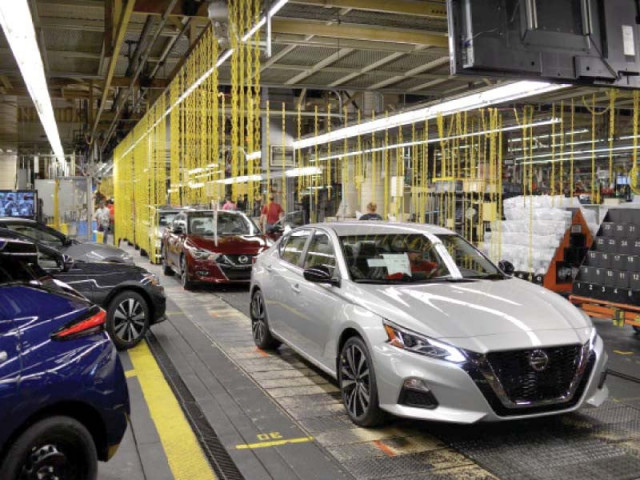Govt may slash taxes on cars
Vehicles up to 800cc likely to become cheaper after budget

The government is considering reducing taxes on new imported and locally assembled cars of up to 800cc engine capacity in the next budget aimed at bringing these within the purchasing power of the middle class.
The proposal, which will be further fine-tuned today (Thursday), seeks to cut import duties and taxes on new imported cars by up to 63% and reduce them by nearly 7% for locally made cars, sources in the Ministry of Industries told The Express Tribune.
The proposal includes abolishing 50% regulatory duty, either eliminating 7% additional customs duty or reducing the customs duty by the same percentage and abolishing 2.5% federal excise duty on new imported cars, the sources said.
In addition to that, there is also a proposal to abolish 5% withholding tax and reduce the standard general sales tax (GST) rate of 17% to 12% on the import of new cars of up to 800cc, they added.
The existing combined taxes and duties on new imported cars of up to 800cc are about 132% of the price which, if this proposal is implemented, will come down by 63% of the value of imported cars, said the sources.
Read more: Delay in delivery of cars worries parliamentarians
In the small category, the price of a new imported car may go down by Rs300,000 to Rs400,000, subject to implementation of this proposal, said the sources.
These taxes have been kept high to provide protection to local assemblers who have long been fleecing the consumers. New vehicles can be imported by anyone against payment of duties and taxes levied under the existing import procedures and requirements laid down in the Import Policy Order and Customs law.
The sources said that there is also a proposal to abolish 2.5% federal excise duty, reduce the GST rate to 12% and abolish Rs7,500 advance income tax on locally made cars of up to 800cc. Subject to endorsement of the proposal, the price of a 660cc Suzuki VXL may fall by Rs109,000 to Rs1.53 million, said the sources.
However, various factions have started lobbying against the proposal and the matter is now to be discussed by the finance minister and the prime minister for a decision, said the sources.
The proposal has been worked out on the direction of Prime Minister Imran Khan who wants small cars to be in the reach of the middle class that currently cannot afford them, said the sources.
Finance Minister Shaukat Tarin is said to be in favour of reducing some taxes, but he is wary of its negative implications for the revenues, said the sources.
One suggestion is that in order to compensate for some of the revenue losses, the duty rates of 1,300cc and above may be increased, said the sources. There has been influx of imports of largely expensive brands in this fiscal year.
High taxes
During the July-April period of this fiscal year, Pakistanis imported Rs297 billion worth of vehicles and paid Rs175 billion in duties and taxes at the import stage, according to the Federal Board of Revenue (FBR) statistics. The Rs175 billion was equal to 59% of the value of these vehicles.
The taxes collected at the local stage are in addition to Rs175 billion.
There was an increase of 68% in the import of vehicles and consequently government duties and taxes also jumped by 77% during this period.
The government collected Rs85 billion in customs duty - up 76%, Rs67.2 billion in sales tax - higher by 61%, Rs15 billion in income tax -up 119% and Rs7 billion in federal excise duty - higher by 367% during the July-April period, according to the FBR numbers.
Used vehicles are not importable into Pakistan in normal course of import procedure. The law, however, provides an exception in this regard and used vehicles can be imported by overseas Pakistanis under personal baggage, gift scheme and transfer of residence.
There was a proposal to ban the import of used cars but it had not been considered seriously.
EV policy
Sources said that the electric vehicle policy would also continue in the next fiscal year.
The government had promulgated the Presidential Ordinance on February 12 to reduce duties and taxes on electric vehicles and discourage “own money” on sale of locally made cars.
The ordinance is going to lapse next week, which will be given cover in the new Finance Bill.
The government has reduced duties and taxes on electric vehicle imports by up to 75%. The components for assembly/manufacture in any kit form (CKD), for non-localised parts the rate is 10% and for localised parts it is 25%.
The GST rate for locally manufactured or assembled electric vehicles till June 30, 2026 is 1%.
The government had also imposed Rs50,000 to Rs200,000 withholding tax on sale of newly bought cars within three months to discourage own money. But this has not helped to curb the illegal practice.
Published in The Express Tribune, June 3rd, 2021.
Like Business on Facebook, follow @TribuneBiz on Twitter to stay informed and join in the conversation.



















COMMENTS
Comments are moderated and generally will be posted if they are on-topic and not abusive.
For more information, please see our Comments FAQ